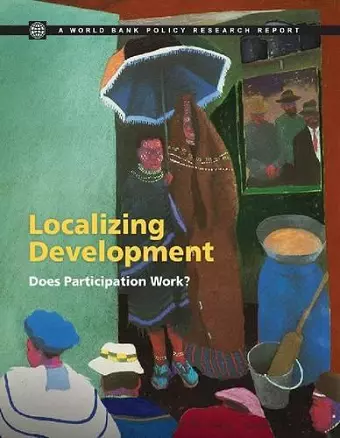Localizing Development
Does Participation Work?
Vijayendra Rao author Ghazala Mansuri author
Format:Paperback
Publisher:World Bank Publications
Published:14th Nov '12
Currently unavailable, and unfortunately no date known when it will be back

The Policy Research Report Localizing Development: Does Participation Work? brings analytical rigor to a field that has been the subject of intense debate and advocacy, and billions of dollars in development aid. It briefly reviews the history of participatory development and argues that its two modalities, community-based development and local decentralization, should be treated under the broader unifying umbrella of local development. It suggests that a distinction between organic participation (endogenous efforts by civic activists to bring about change) and induced participation (large-scale efforts to engineer participation at the local level via projects) is key, and focuses on the challenges of inducing participation.
The report provides a conceptual framework for thinking about participatory development and then uses this framework to conduct a comprehensive review of the literature. The framework develops the concept of “civil society failure” and explains its interaction with government and market failures. It argues that participatory development, which is often viewed as a mechanism for bypassing market and government failures by ”harnessing” civic capacity, ought to be seen instead as a mechanism that, if done right, could help to repair important civil society failures. It distills literature from anthropology, economics, sociology, and political science to outline the challenges for effective policy in this area, looking at issues such as the uncertainty of trajectories of change, the importance of context, the role of elite capture and control, the challenge of collective action, and the role of the state. The review of the evidence looks at a variety of issues: the impact of participatory projects on inclusion, civic capacity, and social cohesion; on key development outcomes, such as income, poverty, and inequality; on public service delivery; and on the quality of local public goods. It draws on the evidence to suggest several recommendations for policy, emphasizing the key role of learning-by-doing. It then reviews participatory projects funded by the World Bank and finds the majority lacking in several arenas – particularly in paying attention to context and in creating effective monitoring and evaluation systems that allow for learning.
Localizing Development: Does Participation Work? gives us a much-needed comprehensive account of the available empirical evidence and puts it in a coherent perspective. It takes a balanced and sensible approach on many of the controversial issues and provides a valuable guide for further research and policy initiatives." —Pranab Bardhan, Professor of Economics, University of California, Berkeley
"Finally, a book that takes a hard, empirically grounded, and comprehensive look at donor-led efforts to promote local participatory development. Drawing on an exhaustive selection of cases and aggregate data that range across virtually every sector of development, Mansuri and Rao draw out the complex set of political, social, and institutional variables that shape the prospects for people's participation in development. For scholars, activists, and policy makers interested in promoting more democratic forms of development, this is required reading." —Patrick Heller, Professor of Sociology and International Studies, Brown University
"Mansuri and Rao give the best existing treatment of the successes and failures of participatory approaches to development. At the heart of this extraordinary study is the recognition of a reality that will be uncomfortable for many: the key challenge of many participatory development interventions is not finding out how best to respond to grassroots pressures, but how to induce them in the first place. Building on a long tradition in political economy they draw attention to the presence of a 'civil society failure' in which, contrary to the claims of optimists, representative voices do not emerge organically. Synthesizing and developing a rapidly growing literature, Mansuri and Rao provide an encyclopedic account of the state of knowledge on top-down attempts to generate bottom-up pressures." —Macartan Humphreys, Professor of Political Science, Columbia University
ISBN: 9780821382561
Dimensions: unknown
Weight: 523g
200 pages